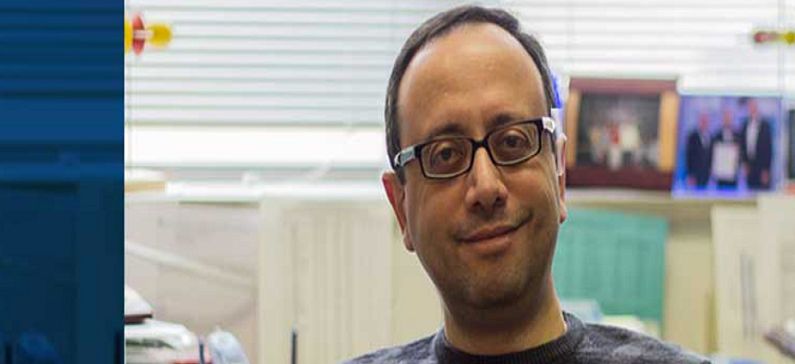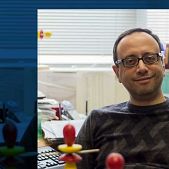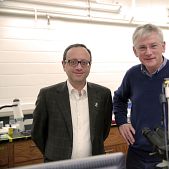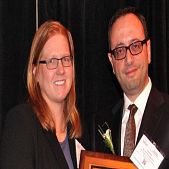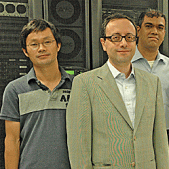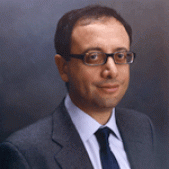- Where are you from?
I was born in Heraklion, Crete, and moved to Athens when I was 6-7 years old.
- How did you choose your field of expertise?
I liked Math and Chemistry, and Chemical Engineering is the field combining the two under one roof. In addition, at the time I was considering college, chemical engineering was among the most competitive departments to get in through the public exams, and because I always liked challenges, I thought I would try that out.
- What are your main research targets this period?
We are trying to understand catalytic chemical reactions at solid surfaces at the elementary step level (e.g.: bond-breaking; bond-making), and starting from basic quantum mechanical principles to elucidate the energetics of these steps, as a function of the electronic structure of the solid surface on which the reaction is taking place. Relying on this fundamental understanding, we then proceed to come up with new materials (e.g.: determining their composition and architecture at the atomic-scale) which could accelerate chemical reactions in a way that reactions would take place at much lower temperatures than current chemical processes, so that we can save part of the energy needed to run the chemical reactors used in industry for these chemical reactions. This approach allows us to improve catalytic processes, which are essential for environmental protection, energy production, chemical and fuels production, etc.
- Which moment of your career, until today, you consider of being the most important?
My decision to pursue graduate studies in the US followed by postdoctoral studies in Denmark. Both places gave me the opportunity to pursue my scientific curiosity and allowed me to be trained in state of the art methods needed to address fundamental questions in the fields of surface science and catalysis.
- You studied in the National Technical University of Athens and you continued your studies and career abroad. Was it a difficult decision to leave Greece? Which are the pros and cons of following a career abroad?
On the personal level, yes, it was a very difficult decision to go away from home, right after college. At the time, telephone communication was very expensive for the stipend of a graduate student in the US, there was no email or internet, and I had to rely mostly on postal mail to keep up with family news and developments while I was pursuing my PhD. I was fortunate to be able to travel back and visit my family once per year or so, but only for a limited time. However, there was no way I could have gotten the training I got in the US for my PhD, if I had chosen to stay in Greece. I loved research and, at that time, there was no way I could pursue research at the most competitive level, as I wanted, if I were to stay in Greece. Accordingly, and after my service to the Hellenic Navy, which followed my PhD, I chose to pursue additional studies, yet in another country: Denmark. I was always driven by my interest in learning the most advanced methods in my research field and becoming part of the effort to push the frontiers in that field. Every time you go to a different country, there are new cultural challenges/opportunities that are encountered. There is a price to pay for being integrated in the new environment, but there is an enormous reward waiting at the end of the road: you learn how to adapt to new environments and how to efficiently work with people/scientists from different backgrounds, which is a key element contributing to a professional career’s success.
- Do you think that research in Greece could be better in the future and give the chance to scientist and researcher to thrive in their own country?
I do believe in the human potential in Greece. I feel that a healthy mixture of classic education, including history (of Greece and of the world), blended with an exceptionally strong technical training are both foundations for cultivating the next generations of ambitious scientists in Greece and in the world in general. Further, the Greek State has to commit the funds necessary to establish and maintain a first-rate research infrastructure, at a level comparable to other scientifically advanced nations (e.g.: at least 2.5% of GDP to be invested in research year after year and for many decades). Further, “Aristeia” and “Eugenis Amilla” are both key notions for upbringing the brightest minds to become leaders and innovators for the future; they need to be cultivated in the young minds by pursuing classical studies in middle and high school, in parallel with rigorous training in math and sciences.
- How often do you visit Greece?
At least twice a year, always for brief visits.
- What does Greece mean for you?
Greece means a lot to many scientists around the world. Among others, several centuries ago, fundamental sciences thrived and some of them got their foundations developed by Greek scientists and philosophers who were curious and pursued answers to their curiosity. I was fortunate to have gotten a great education in classics and in quantitative sciences in Greece, which sent me off to a good career path. Hard work ethic and the continual pursue of excellence was distilled in me in the early stages of my life. I owe this to my family and to my early formative education in Greece. Yet, these are universal values, which I have found in many other scientists around the world, regardless of their origin.
- If you could address a question to all Greeks, what would you like to ask them?
Where would you like to see Greece 50 years from now? If the answer has to do with a science-based prosperity for all its people, then what would be a realistic plan to put together for reaching that goal? Let’s have some wise people with world-class credentials develop that plan and stick to it regardless of political choices which can change from year to year, and from decade to the next.
